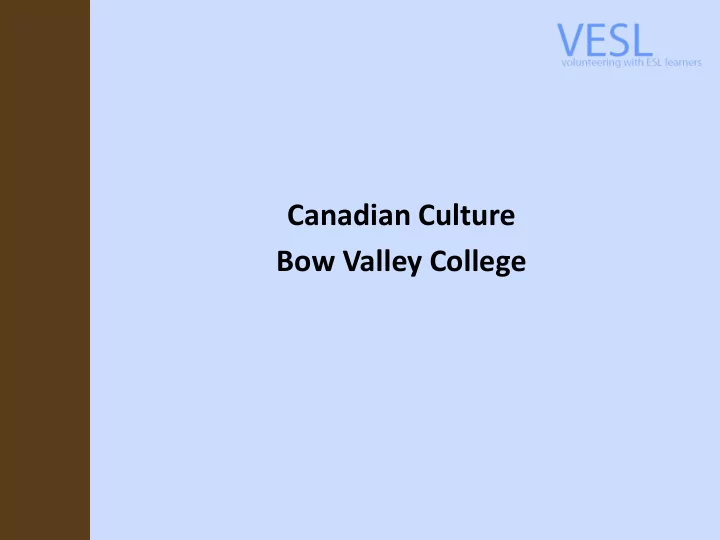

Canadian Culture Bow Valley College
Objectives To examine the meaning of culture To examine intercultural awareness and competencies To examine the kinds of learning that are suited to teaching culture To create a task that helps build cultural awareness
Overview Awareness activities Importance of teaching culture Characteristics of culture What our focus should be Intercultural competencies Stages of intercultural development Who the culture ‘experts’ are Awareness activities Types of learning that work Creating a task Points for reflection
Importance of teaching culture Empowers newcomers with the ability to interact more effectively Helps with integration The 5 th skill?
Characteristics of Culture Culture is learned Culture and its patterns change Culture is a fusion of material, social and subjective elements Not all culture is evident to an 'outsider' - many aspects are hidden Culture is not distributed uniformly among all members of a group Culture is context driven Culture is diverse within a given country Culture is very closely related to language
So, what should we teach? Some considerations Our multicultural environment The impossibility of learning everything about Canadian culture The characteristics of culture The stages of acculturation The answer? Building intercultural awareness and competence
What is intercultural competence? According to Barrett et al. (2013): “It is a combination of attitudes, knowledge, understanding and skills applied through action which enables one singly, or together with others, to: Understand and respect people who are perceived to have different cultural affiliations from oneself Respond appropriately, effectively and respectfully when interacting and communicating (---) Establish positive and constructive relationships (---) Understand oneself and one’s own multiple cultural affiliations through encounters with cultural ‘difference’ “
Bennett’s stages of intercultural development Ethnocentric Ethnorelative Denial of cultural difference Acceptance of cultural difference Defense against cultural Adaptation of cultural difference difference Integration of cultural difference Minimization of cultural difference
Who is the culture expert? Can culture be taught by a volunteer tutor in a non-formal setting? Can culture be taught by someone who hasn’t traveled much? Can culture be taught by an immigrant tutor?
What works best? Learning that is: Experiential Interactive Cooperative Task based Reflective Pedagogically sound Engaging
Points for Reflection Keep a journal on: Where you are on this continuum: ethnocentric ---------------------ethnoreflective Critical incidents you encounter Actions/lack of actions on your part. Reasons.
References Barrett, M., Byram, M., Lazar, I., Mompoint-Gaillard, P., & Philippou, S. (2013). Developing intercultural competence through education. Retrieved from Hub.coe.int Bennett, Milton J.(2004). Becoming interculturally competent. In J.S. Wurzel (Ed.) Toward multiculturalism: A reader in multicultural education . Newton, MA: Intercultural Resource Corporation. PDF retrieved from www.idrinstitute.org Byram, M., Gribkova, B. & Starkey, H. (2002). Developing the intercultural dimension in language teaching: A practical introduction for teacher. Retrieved from http://www.coe.int Peterson, E. & Coltrane, B. (2003, December). Culture in Second Language Teaching . Retrieved from cal.org Sauvé, V. (1996). Working with the cultures of Canada in the ESL classroom: A response to Robert Courchêne. TESL Canada Journal, 13 (2), 17-23. Retrieved from http://www.teslcanadajournal.ca
Recommend
More recommend